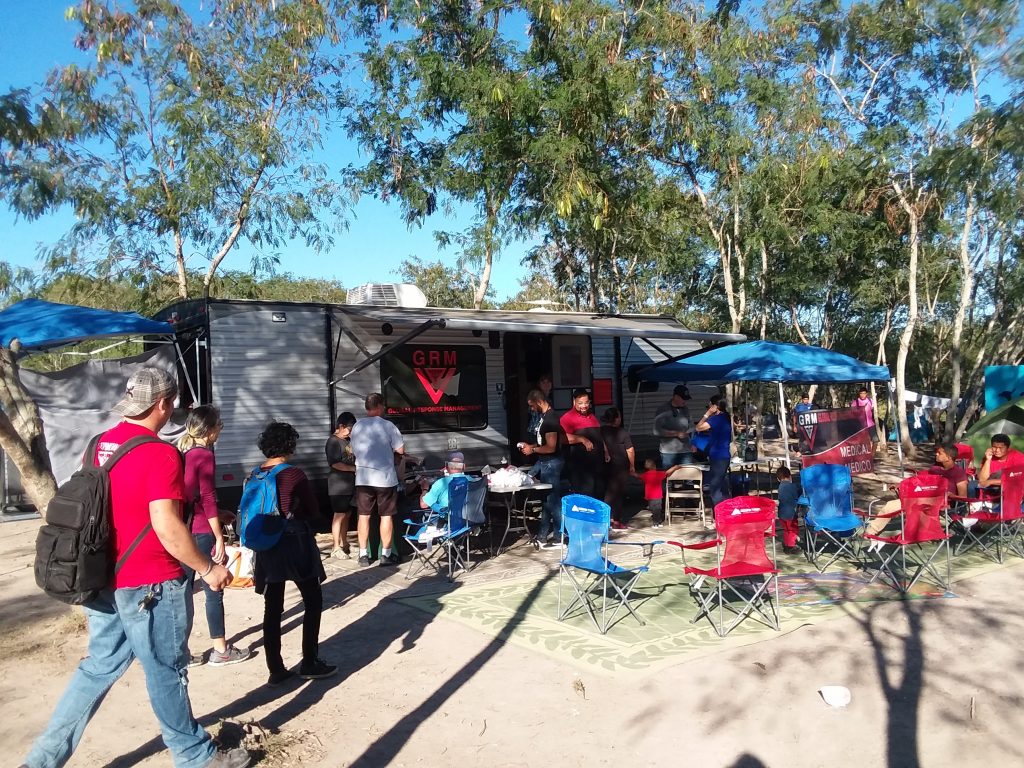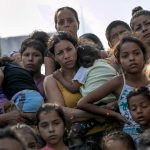Conditions in the Matamoros camp – an informal settlement of 3,000 asylum seekers just across the border from Brownsville, Texas – are poor, with families living in tents and using makeshift latrines and showers. Asylum seekers have reported kidnappings and sexual and physical assaults to GRM staff. The clinic, whose staff includes asylum seeking health professionals, serves around 50 patients per day, including a large proportion of small children and teenagers. Over 400 patients who received treatment at the clinic were critically ill and would have died or suffered severe health impacts without GRM’s clinic, including myocardial infarctions, stroke, ruptured appendixes, acute hypoxia, and anaphylactic shock. There have been no confirmed COVID-19 cases in the camp yet, but cases in the local region are increasing.
The following is an extract from a recent email exchange with Helen Perry and Andrea Leiner. Note that some of the descriptions they provide are graphic.
PHR: How would you describe the condition of the health sector in Tamaulipas today and its main challenges? Do migrants have access to health services locally?
Perry: The public health infrastructure in Mexico has been severely impacted by austerity measures put in place by the Mexican government over the past few years. As a result, access to health care in Mexico is limited for many Mexicans, let alone for asylum seekers and refugees who are coming into the area. Imagine if 3,000 people, all with acute and chronic health needs, suddenly showed up in Dallas, Texas. Our own health care infrastructure would be overwhelmed – imagine, then, what the case would be in places around the world that are already experiencing health care disparities. This is on top of the fact that there is still significant bias and prejudice against Central and South American asylum seekers in Mexico. We have had multiple patients report to us that they do not want to seek health care from Mexican entities because of the prejudice they have experienced.

PHR: How would you describe the level of preparedness for COVID-19 in Tamaulipas at the governmental, institutional, and community level?
Perry: Again, we are talking about an area of the world with significant health care disparities at baseline. Governments across the globe have struggled with how to adequately prepare and respond, and Tamaulipas is no different in this regard. We have seen organized crime organizations step up to provide sanitary resources and food distribution to families, and I think that is a testament to how dire the situation is. Many of the local hospitals are closed to patients with signs or symptoms of COVID-19 and we have heard multiple reports of people being turned away at the door from seeking health care at public facilities. The city of Matamoros has a population of around 500,000 and only about 10 intensive care beds and 10 ventilators. The capabilities locally are incredibly limited, and COVID-19 is only exacerbating that.
“The city of Matamoros has a population of around 500,000 and only about 10 intensive care beds and 10 ventilators.”
PHR: How are migrants coping with this new reality?
Perry: We have definitely seen an increase in mental anguish in the past few months. Not only are families worried about COVID-19, they are also concerned because of the total halt to U.S. asylum proceedings and immigration processing. The reality for many of these families is that the gangs that threatened them in their home countries often still have access to them in Mexico, not to mention the threat of other organized crime groups targeting them.
PHR: How did you come to be doing this work in Matamoros, Mexico?
Perry: After landing from search and recovery efforts in the Bahamas following Hurricane Dorian, I received a call that there was a humanitarian catastrophe on the border. We immediately headed to Brownsville, Texas and crossed the border into Matamoros, where thousands of people were seeking asylum at the foot of the bridge and had been turned away [due to the introduction of the Migrant Protection Protocols (MPP) or “Remain in Mexico’” policy]. They were now homeless and had nowhere safe to go. We began seeing patients immediately on the sidewalk and continued until we established a full-time clinic in the center of the makeshift camp.
“We began seeing patients immediately on the sidewalk and continued until we established a full-time clinic in the center of the makeshift camp.”
PHR: How are conditions in Matamoros different or similar to the other humanitarian settings where you have worked in the past?
Perry: I think it is important to realize that the vast majority of people living in this camp are not “migrants.” A “migrant” is someone who changes locations for a better economic opportunity. These are refugees, who are fleeing severe harm. These are people fleeing the type of violence that we saw from ISIS. Women coming home to find their children lit on fire while still alive, because they could not afford that month’s extortion fee. Children hunted down and murdered in the streets, publicly executed for knowing the names of gang members. Women, sexually mutilated and tortured because their family member worked for an opposing gang.
These are all stories I have listened to firsthand, and it is the same type of violence we saw when we worked in Mosul, Iraq when it was under ISIS control. We once did an exam on a woman who had been tortured and mutilated by the cartel. We had to document her injuries for her medical records and her court case. We normally use a 6-inch paper measuring tape to measure scars. In her case we had to use a 60-inch cloth measuring tape to adequately document some of the scarring on her body, which stretched from her ankles to her chin. Her breasts had been cut off and they had carved the name of the gang on her abdomen.
I once talked to a woman who had fled Honduras with her 10-year-old daughter. She worked for the police and had ended up on a cartel hit list. She and her daughter had less than 24 hours to gather all their belongings and flee for their lives. She knew the cartel would be watching the caravans, so they traveled alone, and only at night, staying off the main roads. She recounted to me how she and her daughter were attacked and raped multiple times on the way. I cried as she told me her story and expressed to her how truly sorry I was, as a fellow human being, that she had to go through that experience, and that her daughter would be traumatized for life.
I’ll never forget how she stopped me, smiled, and said, “You don’t understand: the trauma she has experienced is nothing compared to what her life would have been if we had stayed. It’s nothing compared to what she would have had to go through. I’m grateful we made it. Grateful to be here. To have this opportunity. And that people like you are here to care for us.”
“You don’t understand: the trauma she has experienced is nothing compared to what her life would have been if we had stayed. I’m grateful we made it. And that people like you are here to care for us.”
PHR: What has been the impact of the pandemic on GRM operations, as well as the health of people in the encampment? What adaptations have you put in place?
Leiner: There is global competition for resources and health care professionals due to the pandemic. Procuring supplies and booking volunteers has been challenging, given the limitation on flights, increased border security, etc. When everyone is competing for the same resources, vulnerable populations tend to get left behind.
Perry: We implemented a three-pronged strategy: prevention, fortification, and treatment. For prevention, we focused on education, building hand-washing stations (96 total), and distributing face masks. For fortification, we covered everyone with multivitamins and identified people with comorbidities in order to evaluate their treatment regimen. For treatment, we established an isolation area and built a field hospital specifically for mild and moderately ill COVID patients.
PHR: What has been the greatest achievement of this program so far?
Leiner: Throughout the entire operation, we have faced one obstacle after another – the elements, regulations, transporting materials into Mexico, treating patients with limited resources, and now a pandemic that could spread like rapid-fire through an already depleted population. But we have an amazing team that sees obstacles as challenges to overcome and we never stop pushing forward as advocates for our patients. If not us, then who?
“We never stop pushing forward as advocates for our patients. If not us, then who?”
PHR: What is your top priority now for ensuring access to health services in the encampment?
Leiner: Access is the key word. We work each day to make sure that asylum seekers in Matamoros have access to quality health care and medical professionals. Continued funding for this operation and awareness of the situation are also two areas of focus for us.
PHR: What is your greatest concern, as health professionals, for people living in the encampment?
Perry: The changes with the MPP and the U.S. asylum process have created a situation where already traumatized and vulnerable people are now living in tents along the Rio Grande, exposed and under constant threat from the elements. We are entering flooding and hurricane season, which could be catastrophic for our camp. Also, the threat of COVID reaching the camp weighs heavily on our minds. We have worked around the clock to put prevention measures in place in the camp, but we know that if COVID takes hold, the effects will be devastating.
“The threat of COVID reaching the camp weighs heavily on our minds. We have worked around the clock to put prevention measures in place in the camp, but we know that if COVID takes hold, the effects will be devastating.”
PHR: How can health professionals and other advocates support your work?
Leiner: Join us! Volunteer, donate, stay current on our social media and newsletter posts. We are all stronger together.
Connect with GRM on its website or on Twitter: @GRM_Global
Global Response Management (GRM) is a humanitarian organization which provides emergency and pre-hospital care in areas impacted by crisis and conflict. Having previously served as a nurse in the U.S. Army, GRM Executive Director Helen Perry, ACNP, MSN, CCRN, CEN, joined the organization in 2017 to provide care in Mosul, Iraq, and later to Rohingya refugees in Cox’s Bazar, Bangladesh. GRM Director of Strategic Plans Andrea Leiner, FNP-BC, ACNP-S, MSN, decided to enter the medical field after watching the devastation of 9/11 firsthand from her office.

